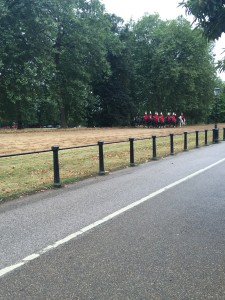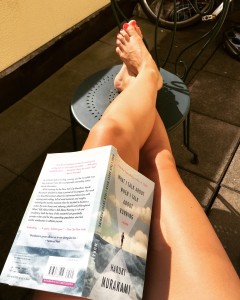My last full day in London is a holiday Monday in North America, so my brother is back at work. The day stretches out before me. I reach out to grab it with a deep breath of someone who knows my own return to the grind is imminent.
 I set out for Hyde Park, ready to run. The weather is crisp and the sky is a smoldering grey. But I’m determined to run through the rain if I need to. Once I’m through the gates, I push off, my new stride carrying me forward at a steady yet energetic pace.
I set out for Hyde Park, ready to run. The weather is crisp and the sky is a smoldering grey. But I’m determined to run through the rain if I need to. Once I’m through the gates, I push off, my new stride carrying me forward at a steady yet energetic pace.
The greens around me are vibrant. I make my way past the pedestrians, slow and strolling, then watch as leash-less dogs bound through the grass like this is the best day of their lives. It isn’t long until I’m lost in the steps, forging a route with no known destination. I choose paths at random until I’m lost not just figuratively but geographically as well.
I suppose that’s the point of running. At least, it is for me. But I’m not alone. While away, I’ve been reading a memoir by the bestselling novelist Haruki Murakami called What I Talk About When I Talk About Running. He’s completed 23 marathons at the time of writing this book (one per year) and written more than a dozen novels. Directly and indirectly, Murakami explores his writing process by discussing his running journey.
Although I found running only two and a half years ago, I’ve felt its strong connection to my writing ever since. When people ask me why I run, I find myself talking about it being the only effective way to give my mind a break. Rather than whirring through its random firings of character dialogue, plot points, hypothetical scenarios, word combinations and more, my mind is quiet. Something about the steady rhythm of my steps lulls its overactivity into a kind of trance. It’s a peace I never get with sleep, so haunted by vivid dreams that I remember long after I wake.
 “I’m often asked what I think about as I run,” Murakami writes. “Usually the people who ask this have never run long distances themselves. I always ponder the question. What exactly do I think about when I’m running? I don’t have a clue.”
“I’m often asked what I think about as I run,” Murakami writes. “Usually the people who ask this have never run long distances themselves. I always ponder the question. What exactly do I think about when I’m running? I don’t have a clue.”
He describes a “homemade void” that encompasses his mind when he runs. Murakami can’t answer the question of what he thinks about during his runs, especially the long ones, because the point is to allow himself not to. “I just run. I run in a void,” he says. “Or maybe I should put it the other way: I run in order to acquire a void.”
The void isn’t just a break from all the inner turmoil a creative person experiences as a byproduct of their art. The mind void is a necessary part of creating. How do you paint a masterpiece without a blank canvas? You have to get rid of the noise in order to begin.
I find this particularly difficult. I tend to charge at things that fill up my calendar. I use time blocking to plan out my day at work but also at home.
On top of this natural tendency, I think our world is set up to plug every moment of time with something. When bored in transit, you pull out your phone to scroll through social media. When preparing dinner, you turn on Netflix for company. When walking down the screen, you listen to a podcast. Every moment is accounted for, swallowed up by activities that keep your mind busy. Distractions: they collect like steam on your glasses, preventing you from having those moments of clarity that exist outside the daily tasks it takes to live a life. There is no room to stretch. Before you know it, a year has gone by and that dream you have, the dial on it hasn’t moved any closer to reality.
So when I get the opportunity to run, or spend a day by myself just wandering around, I jump at it. And I need to start jumping more.
Solitude is not uncomfortable to me. It feels like a rush of air after holding your breath for a very long time. I revel in the roomy sensation that wraps around my lungs. The joys of being a secret introvert.
Time alone, with no particular task at hand, it may seem like a waste of time to some. But I know it’s quietly moving the dial by launching me into the void. I hope to bring a good helping of that home with me from this trip—along with the souvenir tea, biscuits and Turkish delight—so it can swallow me whole in the coming months. Everything is about to change.
